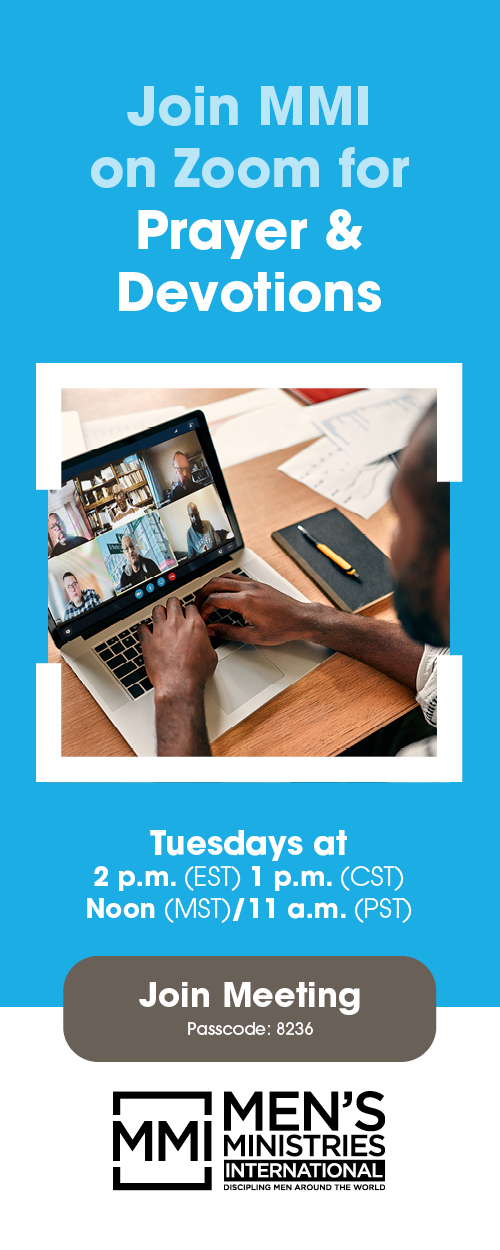
David Tingley
David Tingley is a Ph.D. student in Biblical Studies/New Testament at Asbury Theological Seminary in Wilmore, Kentucky, where he and his wife, Alexis, live with their three young kids. He also teaches Bible classes online as an adjunct professor at Crown College in Minnesota.
By David Tingley
I grew up attending a Free Methodist church in the Southern Michigan Conference. My earliest memories of church entail hearing hymns, eating Cheerios under the pew, and listening to our pastor tell stories that began with lines like, “When I was at the grocery store the other day…” Week after week, I grew accustomed to our church’s culture and routines. Although I often preferred to be elsewhere, at church, I knew what to expect. At church, I was comfortable, even if a bit bored. I knew the worship services that seemed so long would end (eventually) and I would be free to walk home with my dad, often tossing the football on the way.
But one Sunday night back when the church still had Sunday night services — and I had to go to them — what had become so predictable was interrupted by a guy with an acoustic guitar. “The dirt man,” as my family called him — apparently because he delivered a load of dirt to our house one time, was all of a sudden playing music I enjoyed and singing God’s praise. Previously for me, those two things had been mutually exclusive. But now the dirt man — and the God to whom he was singing — had my attention.
Acoustic Exhortation
Like the dirt man interrupting my church’s routine with an acoustic guitar on a Sunday night, the author of the New Testament book of Hebrews interrupts his audience from what was familiar and comfortable for them to focus their attention on God and His great salvation in Christ. (The author’s use of a masculine participle — διηγούμενον / diēgoumenon — in 11:32 suggests that the author is male, so I refer to the author with masculine pronouns.)
_
“The language of the Greek Old Testament was for the audience of Hebrews what hymns and grocery-store sermon illustrations were to me: expected and familiar.”
_
For the original audience of Hebrews, that which was familiar and comfortable was the Old Testament via its Greek version, called the Septuagint (LXX). New Testament scholar Paul Ellingworth notes that the author of Hebrews expected his readers to be “thoroughly acquainted with Old Testament persons, institutions, and texts … and to accept unquestioningly the divine authority of the Old Testament.” The language of the Greek Old Testament was for the audience of Hebrews what hymns and grocery-store sermon illustrations were to me: expected and familiar.
So, like a good preacher, the author of Hebrews begins with the common ground he shares with his audience: the Old Testament in Greek. In Chapter 1, there are quotations from seven different Old Testament passages that form an impressive argument about the superiority of God’s revelation in His Son, Jesus Christ, compared to His revelation in the Old Testament and to the angels through which some of that revelation came. The author’s liberal use of the Greek Old Testament in Hebrews 1 forms a rhetorical connection with the audience based on language with which they were accustomed and familiar.
In the first four verses of the next chapter, Hebrews 2, there is an abrupt shift in tone and terminology as the author departs from LXX-based vocabulary toward what William L. Lane calls an “idiomatic Hellenistic diction.” Hellenism is the broader first-century Greco-Roman world in which the letter/sermon of Hebrews was written. It is out of Hellenism that koine or “common” Greek came, the language in which the entire New Testament was written. Lane further observes of the Hellenistic vocabulary of Hebrews 2:1–4 that the number of unusual words and idioms and the avoidance of the vocabulary of the LXX in it “suggest that in this paragraph it was the writer’s intention to confront the thought and life of his readers in a more arresting way than reliance upon familiar words and phrases would foster.”
_
“Like a good sermon, Hebrews aims not just to inform but to transform.“
_
Interesting, right? The author of Hebrews interrupts the believers he addresses in 2:1–4 with words and phrases they would expect to hear not in church gatherings but in other activities —such as sailing a ship, navigating a legal case, or reading classical Greek literature. Just as the dirt man used an acoustic guitar to lead our church in worship instead of leading us in another hymn on that Sunday night, so the author of Hebrews used jarring, Hellenistic language in 2:1–4 instead of the familiar, comfortable terminology of the LXX.
Like a good sermon, Hebrews aims not just to inform but to transform. Its structure is composed of repeating cycles of exposition and exhortation, of verses that interpret Old Testament Scripture followed by verses that apply it to the audience. Hebrews 2:1–4 is the book’s first exhortation, which we might further label an “acoustic exhortation,” where the original audience heard in the vivid, alliterative, and popular Greek diction of Hebrews 2:1–4 how to respond to the message of Christ’s superiority spelled out in 1:1–14. Since God’s revelation in Jesus Christ is authoritative and definitive, beyond His revelation of the Old Testament, then we ought to “pay the most careful attention” to the gospel message we have heard, lest we “drift away” from it (Hebrews 2:1).
The word translated “pay attention” (προσέχω / prosechō) is a technical sailing term used in Hellenistic society to refer to a ship held at port, lest it carry out the action of another sailing term present in Hebrews 2:1 and “drift away” (παραρρεύω / pararreuō). This language puts the audience of Hebrews — including those of us encountering Hebrews today — in the place of a vulnerable ship in the midst of violent waves and deep-sea waters. This warning via nautical terms captured the original audience’s attention in a different way than the quotations from the Greek Old Testament did in Chapter 1. Later on in the sermon, in Hebrews 6:19, the author reminds us that we have the hope of Christ as an “anchor for the soul.” Both instances of maritime imagery in Hebrews serve to encourage us to persevere on the high seas of our journey with Jesus.
Hebrews 2:2–3 features terms commonly used in Hellenistic legal contexts. “For since the message spoken through angels was binding, and every violation and disobedience received its just punishment, how shall we escape if we ignore so great a salvation?”
The word translated “binding” (βέβαιος / bebaios) in the NIV also appears in its verbal form in v. 3b to communicate that the salvation of the Lord was “confirmed” (ἐβεβαιώθη / ebebaiōthē) by those who heard Him. Notably, the author had access to other, more LXX-friendly Greek words he could have used to communicate the “established” or “well-founded” status of God’s revelation. In fact, he uses one of them, θεμελιόω / themelioō, in 1:10 as part of quotation of Psalm 102:25 (101:26 LXX). But in 2:3, the author chooses instead to use a more attention-getting word, βεβαιόω / bebaioō, which is rare in the LXX. In this way, the author resists falling back on a familiar hymn and keeps the audience’s attention with the acoustic guitar.
Acoustic Risk
Both the dirt man and the author of Hebrews exhibited courageous leadership in their decisions to depart from the familiar and comfortable to risk trying something different. As the saying goes, we often have to “risk it for the biscuit.” The author of Hebrews chose to use intentionally Hellenistic diction in 2:1–4 to get the audience’s attention not only for the immediate warning contained in those verses, but also to secure the audience’s focus on the riches of Christ’s person and work awaiting them in the rest of the sermon.
The author would soon turn back to the familiar language of the Greek Old Testament, even as early as 2:5, where he begins a quotation from Psalm 8. By then, due to the jarring language of 2:1–4, he would have gained the audience’s attention even more for the rest of the message of Hebrews that reiterates the importance of enduring faithfulness to Christ with rhetorical skill and great urgency.
_
“I was given a new, Spirit-infused perspective on His presence in our midst.”
_
In a similar manner, the dirt man’s worship leading on that Sunday night was a risk. I remember that moment in my church’s history as part of the “worship wars” of conflicting opinions about what music is (and is not) appropriate in church. Fortunately, our church was blessed with godly and wise leaders who helped the congregation navigate those unfortunately troublesome waters with grace and conviction. But the dirt man’s “acoustic risk” was also God’s way of getting my attention for what lay ahead for me in my relationship with Jesus.
My experience on that Sunday night began to transform my experience of church from a place I had to be to a place I wanted to be. God used that moment to get a foothold in my life, and he would continue to use the people of that church to eventually get all of me. I would even grow to appreciate the hymns, grocery-store sermon illustrations, and other familiar elements of my church’s culture I once found boring. I was able to become attentive to how God was present in and through them. How? The dirt man’s “acoustic interruption” of our church’s routines became a tool in the hands of God whereby I was given a new, Spirit-infused perspective on His presence in our midst — even (and especially?) in the familiar.
Departing from what is familiar and comfortable involves risk. But risks often result in rewards. What risks might the Lord have you take as you walk with Him in courage and faith? How might you deviate from what is familiar and comfortable in order to reach out to a neighbor, teach a child, or influence your church for Christ? To borrow more words from the author of Hebrews, “And God permitting, we will do so” (6:3).
+

David Tingley
David Tingley is a Ph.D. student in Biblical Studies/New Testament at Asbury Theological Seminary in Wilmore, Kentucky, where he and his wife, Alexis, live with their three young kids. He also teaches Bible classes online as an adjunct professor at Crown College in Minnesota.









